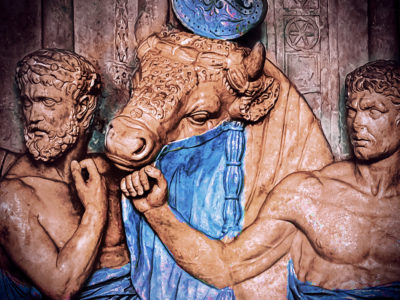I HAVE A HEADACHE. I rarely get them. But the Bible book of Leviticus is giving me a whopper today.
You know those story lines where people get caught in a time loop? Like the movie Groundhog’s Day? That’s what Leviticus is like: repetitive.
People in creative fields like writing, art, and photography don’t want repetition. They want to create something new. Something fresh. Something other than intestinal fat burning on an altar as a sweet smell to God, in chapter after chapter after chapter.
I’m at only chapter nine, in paraphrasing The Casual English Bible, and there are 27 in all. So I’m hoping I haven’t already seen every scene to be seen, if you know what I mean.
There have been occasional side trips that change the pace. We’ve got Moses dabbing blood on the ears, thumbs, and toes of the priests he was ordaining: his big brother Aaron as Israel’s first high priest, along with Aaron’s sons. Keeping it all in the family.
There were many kinds of sacrifices. Sometimes people of Israel would burn the whole animal. Sometimes just the juicy fat and favorite cuts of meat such as liver and kidney. Sometimes they’d just wave the offering at God, then they’d eat it themselves.
The burnt offering was worst, I think, and was probably the most common. It’s what Abraham was planning to do to his boy Isaac:
“Cut the animal into pieces, including the head and the fat. A priest will set them onto the fire on the altar” (Leviticus 1:11-12, Casual English Bible).
The more I read about what people did in Old Testament times to stay on good terms with God, the more grateful I am that Jesus took care of it all.
“We are holy now. Jesus did that for us by sacrificing his body one time for all time. Priests, on the other hand, offer the same sacrifices day after day, which can’t get rid of sins. That’s not what our priest does. With him, one sacrifice is good forever. …With just one sacrifice, Christ made God’s people holy. Those people devoted to God are now perfectly free of sin and guilt, forever” (Hebrews 10-14 Casual English Bible).
I know. We don’t feel holy.
But “holy” is not a feeling. It’s a state of existence. Moses anointed with oil everything in the tent worship center, and that made everything holy. That’s because its state of existence was this: Reserved for God. Everything in the worship center was devoted to God. That’s what made it holy in God’s eyes. You can read it in Leviticus 8 when I get it posted in a few days.
We’re holy when our state of existence is: Reserved for God. We’re devoted to him.
“Holy” doesn’t mean “perfect” when related to anything we humans make. We can’t be perfect. But we can be devoted to and focused on God. And we can live a life that way.
The old Jewish laws don’t apply anymore. No need for circumcision, sacrifices, tithing, or observing kosher food laws.
God had said the time was coming when he would retire the Old Testament system: “I’m going to embed my laws into their minds. I’m going to write them onto their hearts….God called this a new agreement. It replaced the old agreement, which became obsolete and is already on the verge of disappearing” (Hebrews 8:10, 13 Casual English Bible)
We can even eat fat with a fork like my Grandpa Miller did. But I hear its not healthy. And I wonder if that’s why Moses said God wanted everyone to stay away from it.


I’ve read it — but kind of skimmed the repetitive stuff. I can’t imagine paraphrasing it.
You’ve definitely got your work cut out for you, Steve. Though I’m sure that somewhere in this exercise lies a new revelation or two.
If you need to know how to make an animal or grain sacrifice 3,000 years ago, I’m your guy.